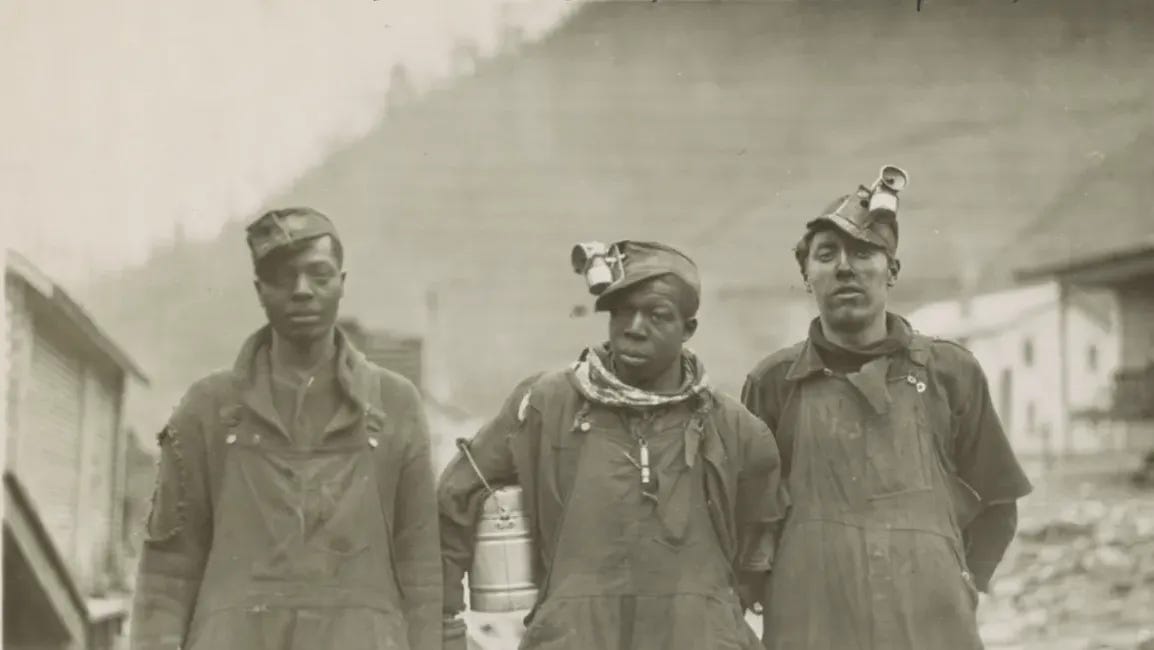Real Rednecks Resist!
Class division, rural extraction, and the labor uprising of the Battle of Blair Mountain
redneck: /ˈrɛdnɛk/ (informal)
An offensive word for a person who lives in a rural area, especially in the southern United States, and who has conservative political opinions and little education.
Oxford Advanced American Dictionary
Hayseeds, yokels and bumpkins are all terms denoting a rural person, lacking a certain craftiness or mental fortitude. In my family, we called them peckerwoods. But a redneck– that is a different thing. The origin of the term redneck might seem obvious at first– a white person, particularly one who is engaged in farm labor, may well find their necks reddened by sun burn after time spent in the field. A redneck is not a gentleman farmer, nor are they necessarily gentlemen at all. And in spite of the descriptive nature of this potentially derogatory word, I would submit to you that not all rednecks are necessarily Caucasian. Are rednecks conservative, and poorly educated, as the Oxford dictionary suggests? Sometimes, or perhaps often in this day and age. But the word redneck, one of our more generally accepted slurs, was also applied to unionized miners of mixed race and ethnicity, on account of their crimson bandanas and “red” ideologies, at least in the early portion of the the 20th century.
“They shot one of those Bolsheviks up in Knox County this morning, Harry Sims his name was… That deputy knew his business. He didn’t give the redneck a chance to talk, just plugged him in the stomach. We need some shooting like that here down in Pineville.” These were the words of a coal operator in Eastern Kentucky, as reported in a 1932 edition of The New Republic, commenting on the murder of a Young Communist League union organizer. It is not often that we see the epithet of redneck used interchangeably with Bolshevik, at least in this century, but as we’ll learn, fed-up miners and rural agitators have put the “red” in redneck long before the word took the form of epithet, and then, a reappropriated and simplified term of pride among the rural (and often suburban) lumpenproletariat.
It may be a stretch for me to share a coal-mining story with y’all for this year’s Labor Day special– after all, this is a publication which primarily concerns itself with matters of agriculture. However, I will submit that agriculture and mining bear certain similarities; they are both practices which are largely extractive by nature, both in their relationship to land and ecology, but also labor. They are largely rural pursuits, and as such, allow for the continued exploitation of rural labor– the types of folks that may be labeled rednecks, or in the case of non-white labor, far worse slurs. Agricultural labor and mining are both forms of labor with deep ties to slavery, and the type of work that is becoming increasingly difficult to find on account of advancements in technology (efficiency of resource extraction). But between the end of slavery and the beginning of conglomeration and automation, both professions were marked by considerable exploitation– and also, resistance to that exploitation.
But stretch I will, as this continuing series on rural discontent would not be complete without some consideration of the Battle of Blair Mountain and West Virginia’s coal wars. But first, a few caveats. The Battle of Blair Mountain is a complex story, and one that belongs to the people of Appalachia, which I am not. The crooked half of my family tree is composed of Scots-Irish southerners, but largely from the Deep South of Mississippi hill country by way of Chicago’s “Hillbilly Heaven” neighborhood. So basically, I’m as removed from my hillbilly past as J.D. Vance, except I’m not a venture capitalist, and I can order a donut like a normal human. This isn’t exactly my story to tell and so I humbly submit these words as a jumping off point for your further consideration, and as part of a larger commentary on what it means to be rural and left in a national political climate that gives us J.D. Vance instead of Mother Jones.
It is also worth noting that I chose to profile Blair Mountain because it is currently the 103rd anniversary of this event, and the largest labor uprising in US history. Before West Virginia’s coal wars, other significant strikes and uprisings took place– many of them ended in massacres– like Thibodaux, and Ludlow, so be sure to read up on these pieces of labor history and share all the grisly details with your friends and family during your end of summer cookout this weekend. But for all intents and purposes, we’re now stepping back a century, before commodified rural culture sprung up in the form of boutique bourbon, $80 RealTree tactical hoodies, OxyContin, and big dumb trucks.


